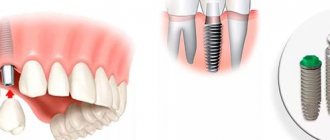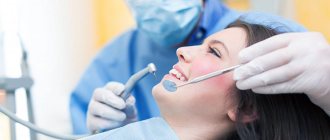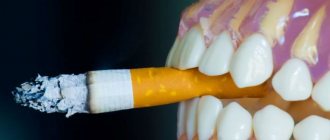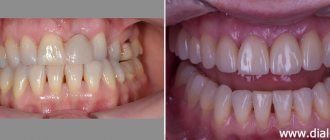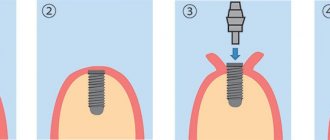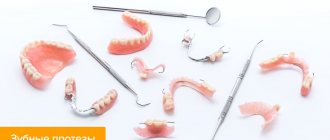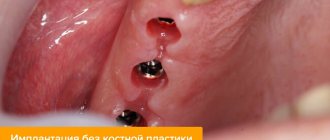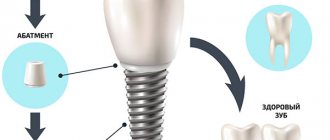The first days after surgery Medicines Physical activity Nutrition Example of a diet What can you drink?
Hygiene Lifestyle What not to do When to see a doctor urgently How to speed up rehabilitation An implant is a metal screw that is screwed into the bone in place of a lost tooth. In order for it to perform all the functions of a natural root, the implant must take root and be overgrown with bone tissue. This ensures its stability in the gum. Engraftment times vary from patient to patient, taking on average 3-5 months
. To ensure that the pin is secured in the gum and does not wobble under load, dentists ask you to follow a number of recommendations. This reduces the risks of complications and rejection to zero, speeds up healing and improves quality of life.
Implantation is a surgical intervention. After any operation, you need time to recover. The first days after dental implantation are especially important, when the mucous membrane is vulnerable to infections and the implant has not yet stabilized sufficiently.
What can and should be done in the first days after implantation surgery
Immediately after surgery, most patients feel some weakness
. These are the consequences of the doctor’s manipulations and strong psychological stress. The jaw may become numb due to the anesthesia. These symptoms disappear quickly, on the same day. Maximum, in 3-4 days, and their intensity decreases all the time.
The main recommendation these days is to stay within reach of a doctor. This will help you get advice if something goes wrong. In large clinics, such as the ROOTT MCDI, ongoing support for patients is organized. You can contact us with a question or problem at any time and from any city. You will definitely be given advice on care after dental implantation, even if you are far from Moscow.
Is it possible to smoke after having an implant installed?
During the period of implant engraftment, smoking is also prohibited, since at this stage there is active formation of bone tissue around the implant body, and smoking can negatively affect this process. At this stage, it can lead to peri-implantitis, when inflammation in the surrounding tissues leads to loss of the artificial root. This complication can occur not only due to smoking, but weakened (due to tobacco consumption) mucous and bone tissue do not contribute to high-quality osseointegration. After successful implantation and installation of a permanent prosthesis, the patient is usually given relief, so many return to the bad habit. However, it should be remembered that in smokers the volume of bone tissue around the implant body decreases faster. If you do not maintain good hygiene, the risk of peri-implantitis remains even with successful initial implant healing.
Medicines and related procedures
Your doctor will likely prescribe pain medications for you. It is important not to get carried away and not to use the medicine more often than once every 4 hours. Although, in most cases, a tablet at night is enough. You should not take painkillers in advance, before the anesthesia has worn off. The pain syndrome may be very mild; pills are not needed.
- Cold compresses
will help relieve swelling. A frozen bag of vegetables, or pieces of ice in a bag should be wrapped in several layers of fabric for greater comfort and to prevent frostbite on the skin. For 1-2 hours, you need to alternate compress (5-10 minutes) and rest (20 minutes). Then compresses can be done occasionally. - Be sure to take all prescribed medications
. Antibiotics are designed to prevent the development of infections, antihistamines reduce swelling. Vitamin complexes supply the body with building substances for rapid recovery, and antibacterial solutions destroy pathogenic microflora in the oral cavity.
In the first days you should not rinse your mouth
. The disinfectant solution is simply held in the mouth for a few seconds.
Nutrition
When can you eat after implantation? The shortest period of fasting is until the anesthesia wears off. The general recommendation is to wait 3-4 hours
. Specific nutritional advice during post-implant rehabilitation may vary slightly depending on the protocol (minimally invasive or classic, immediate loading or not). However, the general principles are the same:
- give preference to warm food, food should not be too hot or cold;
- in the first days, avoid solid foods;
- avoid spicy, pickled, salty foods;
- make sure that the diet is of high quality and healthy;
- drink a lot of water ( 1.5-2 l
).
Approximate diet
Calcium is a building material for bones. Therefore, if you consume dairy products, focus on them.
- Cottage cheese, yoghurt, kefir, fermented baked milk and milk will help diversify your diet and avoid unnecessary stress on the implant.
- A baby food diet is ideal. It is subject to strict safety and nutritional requirements, so vegetable, fruit and meat (required!) purees will provide your diet with the necessary nutrients.
- Meat broths contain a lot of useful substances, including collagen - an important building material for tissues. In the first week, it is better to give preference to pureed soups.
- You can puree not only soups, but also vegetables and fruits.
- Porridge, milk, water, broth.
How long after you can eat solid food depends on the method of implantation.
When using the immediate loading protocol, you can transition to solid food much earlier, on the second day. Chewing load stimulates blood circulation and tissue regeneration
What is better to drink after dental implantation?
Water is the best choice. It not only replenishes fluid, but also removes residual elements of drugs from the body.
Herbal tea is also good. Provides fluid and calms nerves. The main thing is that it is not hot.
Fresh juices and smoothies will give you a boost of energy and a complex of microelements. Cold temperatures should be avoided here, so it's best to let the ingredients sit at room temperature rather than using them straight from the refrigerator.
Hygiene
If you have stitches, try not to touch them with your tongue and, especially, with your hands. Rinsing with antiseptics should be replaced with oral baths. Just hold the solution in your mouth without making vigorous movements.
- Brush your teeth with a soft toothbrush, gently and thoroughly. Bacterial plaque is a direct path to infection.
- It is better to use anti-inflammatory pastes with herbal complexes.
- A week after the operation, treatment with an irrigator is added to hygiene procedures. Water washes away small particles stuck between the teeth and massages the gums, promoting their healing after implantation.
After surgery, be sure to use a new toothbrush.
After the recovery period, it is recommended to care for your teeth in the same way as natural teeth. Clean 2 times a day
, use an irrigator, perform professional dental hygiene and visit the dentist
2 times a year
.
What recommendations should be followed after the stage of permanent prosthetics?
The last stage of implantation is the stage of permanent prosthetics, during which a permanent crown is placed on the implanted artificial root. After installing a permanent crown on the implant, you can safely return to your normal routine. But there are still several recommendations that are important to follow even after complete completion of treatment.
They will be as follows:
- In the first months after installing a crown on an implant, try not to overload the artificial root. Do not try to crack nuts or open bottles, chew with some caution;
- Despite the fact that artificial teeth are placed on the implant, they need to be cleaned with the same regularity as natural teeth. That is, twice a day - with a properly selected brush and paste;
- It is important to clean the crown on the implant on both sides and do not forget about cleaning the spaces between the teeth! Special brushes and irrigators can help you perform this task efficiently;
- In caring for teeth after implantation, you can and should use rinses and balms, but it is better to refrain from using whitening pastes with abrasives.
And of course, do not forget about such mandatory recommendations as regular visits to the clinic, to the doctor, for preventive examinations. During the year after implantation, you need to visit the doctor’s office once every 3-4 months, then twice a year.
Compliance with all the recommendations discussed in the article is a guarantee that the dental implant will take root both in the postoperative period and after installation of the crown, no complications will arise!
Calculate the cost of treatment by taking a short test in 20 seconds!
Do not delay your treatment, because in this matter time plays against us.
Lifestyle
Our life consists of more than just diet and exercise. There are a lot of things planned for every day. Not everyone has the opportunity to go on vacation or take sick leave. What you definitely shouldn’t do is go to work immediately after installing the implant. Give your body time to recover, take a time out, at least for a few hours.
- Avoid extreme temperatures. Cancel the bathhouse, sauna or ice-hole jumping. It’s also better to postpone the pool for a month.
- You should not fly on an airplane during the first week. If a sinus lift was performed, it is better to postpone the flight for a month.
- During your recovery from upper dental implants, you need to be careful when coughing and sneezing. Try not to puff out your cheeks, open your mouth only slightly. Blowing your nose is not recommended at all, but if necessary, do it without effort or strain.
- This is a good time to quit smoking. You absolutely cannot smoke on the first day, and then you simply cannot. If you can’t bear it, after each cigarette you need to rinse your mouth with an antibacterial agent like Miramistin. Smoking slows down recovery after implant placement. The percentage of successful engraftment in smokers is also lower than in non-smokers.
What not to do after dental implantation
We have already discussed some prohibitions above. What's even better not to do?
?
- Brush your teeth with an electric toothbrush until osseointegration is complete. Vibrations and pressure can loosen the pin. This also applies to overly vigorous cleaning with a regular brush. Implants love tenderness and accuracy.
- Use dental floss until the gums are completely healed. The irrigator takes on the function of dental floss during rehabilitation.
- Eat nuts, seeds, crackers, chew candy
Dental restoration is too big an investment to waste your efforts because you want crackers.
It is strictly forbidden to drink alcohol after implantation. Fusel oil and impurities found in alcoholic drinks irritate the gums and provoke hematomas and inflammatory processes. Alcohol negates the effect of antibiotics. In addition, while intoxicated, it is difficult to follow recommendations, and it is easy to miss a doctor’s appointment or hygiene procedures. All this affects the healing of the implant.
Recommendations after implantation include a ban on coffee and strong tea. They raise blood pressure, which can lead to bleeding.
Smoking and implants: why is this a bad combination?
Dental implants and smoking are incompatible things. There are many reasons for this. Some patients are very surprised when they learn that smoking is prohibited before and after implant surgery. They sincerely do not understand how cigarettes can damage the strongest titanium implant. Of course, even a ton of tobacco smoke cannot destroy the implant, but it contains many harmful compounds and carcinogens, including nicotine, hydrocyanic acid and carbon monoxide. Smoking is strictly not recommended even for absolutely healthy people with all their natural teeth, since the problems caused by this bad habit go far beyond the oral cavity and affect almost all body systems. Below are only those factors that negatively affect the process of installation and healing of implants.
- Thermal impact.
When inhaled, the temperature of tobacco smoke can reach up to 70 degrees. The tissues of the oral cavity constantly experience temperature swings. Because of this, not only does the enamel of natural teeth deteriorate, but also the process of tissue healing after surgery worsens. - Deterioration of salivation.
Dry mouth is a common problem for smokers. Violation of the salivation process leads to changes in the microflora of the oral cavity and the active proliferation of bacteria, including in the immediate vicinity of the installed implant. The inflammatory process often leads to peri-implantitis. - Deterioration of bone tissue.
Smoking causes narrowing and spasms of microvessels that nourish bone tissue. Because of this, the quality of bone tissue decreases and the process of osseointegration worsens. - Weakening of the immune system.
Smoking reduces the body's immunity, which complicates the healing process at the postoperative stage and increases the risk of rejection of the artificial root.
According to unofficial statistics, implant rejection in smokers occurs twice as often as in people who do not have this bad habit.
When to start worrying
Slight swelling, pain for 2-3 days
after surgery are considered a normal reaction of the body to medical intervention. The wound may bleed slightly for several hours. The general condition after implantation is also important. If you feel well, swelling on days 4-5 may simply be an individual trait.
However, you need to see a doctor if:
- the pain does not go away on the 4th day after surgery, or even intensifies and pulsates;
- numbness spreads over a large area and does not subside;
- swelling appeared after everything returned to normal;
- the temperature does not fall or rises;
- the bleeding does not stop for more than 3 hours;
- when you press on the gum you feel a sharp pain;
- the prosthesis has become loose;
- It hurts to chew even soft food a few days after the procedure;
- discomfort after implantation does not go away for more than 7 days.
How long does it take for dental implants to take root?
The processes of osseointegration depend on various factors: the patient’s health status, implantation method, type, brand of implantation system. Conventional classical implants take root in the lower jaw within 3.4 months, in the maxillary region - 5.6 months, since the upper jaw bone is less dense.
Some premium implant models have a special coating that accelerates osseointegration processes. If dental structures are made of pure titanium, then healing occurs faster.
